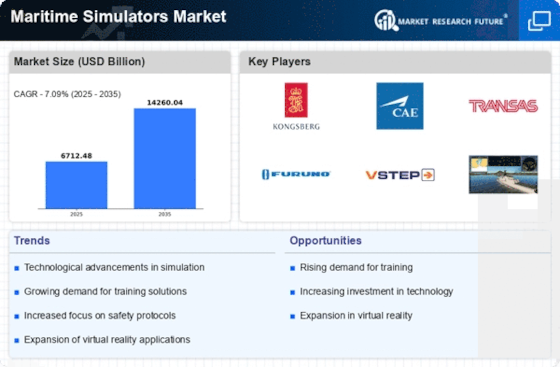Top Industry Leaders in the Maritime Simulators Market

Introduction to the Maritime Simulators Market:
The maritime simulators market is experiencing robust growth due to increasing demand for efficient training solutions in the maritime industry. These simulators replicate real-life scenarios to provide immersive training experiences for seafarers, enhancing their skills and safety. As the maritime sector evolves with technological advancements and stringent safety regulations, the demand for innovative simulation solutions continues to rise.
Key Players in the Maritime Simulators Market:
- Wartsila
- Kongsberg Maritime
- General Dynamics Information Technology, Inc.
- Rheinmetall
- FORCE Technology
- VSTEP Simulation
- Image Soft
- Furuno
- RH Marine
- Virtual Marine Technology
Strategies Adopted by Key Players:
Product Diversification: Key players are expanding their product portfolios to cater to diverse training needs, including ship handling, navigation, engine operations, and crisis management.
Technological Innovation: Continuous research and development efforts are directed towards integrating advanced technologies such as virtual reality (VR), artificial intelligence (AI), and cloud computing to enhance simulation realism and effectiveness.
Strategic Partnerships: Collaboration with maritime training institutes, shipping companies, and regulatory bodies enables key players to gain insights into industry requirements and develop tailored solutions.
Factors for Market Share Analysis:
Product Range and Customization: The breadth of simulation solutions offered by companies and their ability to customize training programs according to client specifications influence market share.
Technological Advancements: Companies investing in cutting-edge technologies and staying ahead in innovation tend to capture a larger market share.
Global Presence: The geographical reach and distribution network play a crucial role in market penetration and capturing diverse customer segments.
Customer Satisfaction and Support Services: Excellent after-sales support, maintenance services, and customer feedback mechanisms contribute to brand reputation and market dominance.
Industry News and Current Company Investment Trends:
Wärtsilä's Acquisition of Transas: Wärtsilä's acquisition of Transas strengthened its position in the maritime simulation market, enabling synergies in technology integration and global market reach.
Increased Focus on Remote Training Solutions: With the onset of the COVID-19 pandemic, companies are investing in remote training solutions and virtual classrooms to ensure uninterrupted skill development for seafarers.
Growing Demand for Cybersecurity Simulators: The rising concern over cyber threats in the maritime industry has led to increased demand for cybersecurity simulation solutions, prompting companies to invest in this niche segment.
Overall Competitive Scenario:
The maritime simulators market is characterized by intense competition driven by technological innovation, product differentiation, and customer-centric strategies. Key players are focused on expanding their market presence through geographical expansion, strategic partnerships, and continuous investment in research and development. The emergence of new entrants and startups brings fresh perspectives and innovative solutions to the market, further intensifying competition. As the maritime industry continues to evolve, companies that can adapt swiftly to changing trends and customer demands are poised to maintain a competitive edge in this dynamic market landscape.
Recent Development:
July 2023, STORM SIM's Sail and Fun received approval from multiple esteemed entities including the Merchant Navy, Social Institute of the Navy, State Ports, Royal Yachting Association, STCW Liberia, and the Spanish Federation of Rescue. Additionally, it was recognized by the Junta de Andalucía as an Official Nautical Academy, authorized to deliver comprehensive and professional training for acquiring various nautical qualifications in Spain.
July 2023, General Dynamics Information Technology (GDIT) was awarded a substantial training support services contract worth USD 383 million by the Naval Surface Warfare Centre Dahlgren Division in Virginia. The contract, spanning a base period of one year and four option years, was granted to the Surface Combat Systems Training Command (SCSTC). GDIT's responsibilities include training over 100,000 US and allied sailors through both classroom and simulation environments, both onshore and aboard Navy vessels globally, throughout the contract duration.











